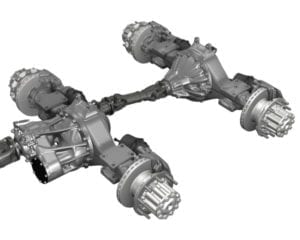In test runs in the Eastern Cape, fuel savings of more than 5% have been achieved by two Mercedes-Benz Actros 6×4 truck-tractors, fitted with RT440 hypoid rear axles as standard. What makes this saving significant is that the drivers in this test run were not Mercedes-Benz driver trainers, but normal fleet drivers.
During the fuel consumption testing in the Eastern Cape region, the vehicles not only achieved the targeted fuel saving in comparison with the predecessor models, but already surpassed all expectations early into the trial by proving to be even more frugal than anticipated. Each vehicle completed 9 920 km under some of the most extreme conditions on the Eastern Cape roads. The test route of 620 km started in East London and then followed the N2 over the Kei River back onto the N6 and over Penhoek Pass (1 884 m above sea level and with a maximum gradient of 10%) before returning to East London. The accumulated climbing height for the total route of 620 km is 9 389 m. During the comparative drive, the test engineers monitored every diesel refuelling as well as the swapping of the drivers and semitrailers. The aim of the latter was to rule out differences in driving styles and the rolling resistance of the semitrailers, which might distort the fuel consumption measurements. Fuel economy in vehicles can be improved in many ways: increasing engine efficiency, reducing aerodynamic drag, rolling friction and improving the fuel quality, among other factors. Mercedes-Benz engineers have developed a new hypoid rear axle for the current Actros 2644LS/33 and Actros 2654LS/33 6×4 truck-tractors that were tested under everyday conditions along Mercedes-Benz South Africa’s (MBSA) well-known trial routes in the Eastern Cape. Mercedes-Benz trucks combined the OM 502LA engine with its 540 hp with the RT440 hypoid rear axle in the Actros 2654LS/33, which replaces the other air-suspended 2650LS/33. It now has a 3.583 rear axle ratio.Christo Kleynhans, Mercedes-Benz trucks product manager, says: “The new RT440 hypoid rear axles make for the most fuel-efficient Mercedes-Benz 6×4 truck tractors of all time. In fact, the fuel saving achieved on the 2644LS/33 was 5.67% and on the 2654LS/33 was 5.37%.”
Kobus van Zyl, vice-president of MBSA commercial vehicles,adds:“As in normal long-distance operations, the drivers were allowed to travel at a max speed of 80 km/h and overrun to 87 km/h on the down hills. All four vehicles were closely monitored on FleetBoard to ensure the drivers followed the testing guidelines at all times. Physical fuel measurements and kilometres readings were also verified against the FleetBoard results.” Clinton Savage, divisional manager for Mercedes-Benz trucks,states: “Light, economical and reliable – the range of hypoid rear axles on these trucks offer not just reliable power transmission, but also allows the most economical driveline for any operation.” Kleynhans says: “South Africa is well-known for its unique operating conditions and the trucking environment, which is spread across fleets ranging from first to third world and makes for a testing ground suitable for a wide spectrum of applications. Due to the outstanding track record of the Mercedes-Benz Testing Department, it was an obvious choice to call on their expertise to perform the comparative test between the new hypoid axles and the existing hub reduction rear axles.” Savage adds: “The consumption figures of the two new Actros truck tractors are even more impressive in view of the guidelines for the test. Unlike normal fuel consumption tests, the comparative run were not carried out on a test circuit but under everyday conditions on busy roads and, at times, under adverse weather conditions.” Technological advances by the MBSA holding company, Daimler AG, in Europe cannot always be implemented locally – a prime example isSouth Africa’s inadequate availability of cleaner fuel, which prohibits the introduction of “greener” and more fuel efficient commercial vehicles. Van Zyl expresses this frustration: “In the absence of the cleaner fuel that is required by our advanced commercial vehicle models already available elsewhere in the world, we can onlytry to improve the performance and total cost of ownership of the current range of vehicles.”






